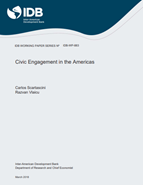Civic Engagement in the Americas
Date
Mar 2018
Summary
This paper estimates the effect of voting eligibility on civic engagement measured along three dimensions: political motivation, political activities, and political knowledge. These outcomes originate in the AmericasBarometer 2004-2016 surveys of eligible voters. To identify the effects the paper exploits variation in field survey dates relative to election dates, given country-specific voting age laws. It is found that voter enfranchisement increases self-reported interest in politics, political socialization, and attendance of political meetings; however, consumption of political news is not statistically different between eligible and non-eligible citizens. Some evidence indicates that the political activities voters engage in translate into increased political knowledge, in contrast with the view that voters are rationally ignorant. The effects are larger in countries with enforced mandatory voting.




